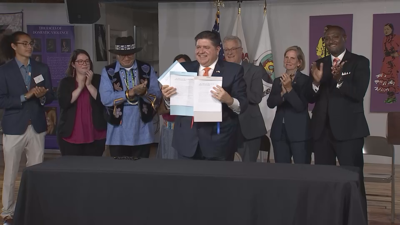SPRINGFIELD, Ill. (WAND) — Several bills signed into law Friday will help Illinois properly recognize and honor the ancestry of Native Americans. Advocates believe the new laws will repair centuries of injustice.
Gov. JB Pritzker and state lawmakers spent the afternoon at the Trickster Cultural Center in Schaumburg to celebrate and honor the people who lived on this land well before it was known as Illinois.
"I know that for many of you it has been a very long road to get here," Pritzker said. "And I remain committed to ensuring our Native American communities are heard, seen, and respected."
Thousands of Native remains and artifacts currently sit in museums across the country. Many remains were dug up by the Department of Transportation to build highways years ago and were put into desk drawers, according to Native historians.
Although, a new law calls on the Illinois State Museum and federally recognized tribes to help return the Native remains and artifacts for proper burial. The law will also allow the state to create a cemetery for remains that are unable to be identified.
The Illinois State Museum plans to return 1,100 of the 7,000 known Native American remains Illinois currently holds. The Pritzker administration noted that Illinois currently has the second largest collection of repatriated remains in the United States.
Violators of the new law will be charged with a Class A misdemeanor for their first violation and a Class 4 felony for subsequent violations. They could also be liable for fees to clean, restore, or repair Native materials found. Restitution will be deposited into a Repatriation and Reinternment Fund.
"Illinois is proving that the government is capable of reflecting on the harmful past and planning for the future that respects and celebrates our interconnectedness," said Joseph "Zeke" Rupnick, Chairman of the Prairie Band Potawatomi Nation.
Illinois public schools will also be required to allow students to celebrate their cultural, ethnic, or religious identity during graduation ceremonies. Sponsors and advocates say Native American students are often given eagle feathers and other tribal regalia to show pride and gratitude for their academic achievement.
Lawmakers filed this plan following an incident last year when a Native student was told he couldn't wear an eagle feather and native beads with his cap and gown. Nimkii Curley was forced to watch his classmates graduate while he sat in the bleachers.
Curley told WAND News last fall that he would've been the first man in his family to graduate from high school if Evanston Township High School administrators let him participate in the ceremony.
"My grandfather was a boarding school survivor and my father didn't graduate from high school," Curley said. "So I would have been the one to break the cycle. I would have been the one to have that graduation ceremony, so that's why it's really important for us."
Pritzker and sponsors invited Curley to the bill signing ceremony Friday to properly celebrate his graduation and recognize his effort to change school policy.
"Thank you for being a catalyst for change," Pritzker told Curley. "You should never have been denied the opportunity to walk alongside your classmates and we will all work tirelessly to protect and expand your right to be who you are."

Gov. JB Pritzker celebrates with lawmakers and advocates after signing three bills into law to increase protections for Native Americans on August 4, 2023.
A separate law will require school districts to include Native American history curriculum in their social studies classes starting with the 2024-25 school year. Advocates have worked with lawmakers over the past few years to draft the best language for teaching students about major events of the Native American experience and Native history of the Midwest and Illinois.
Students in sixth grade and up would be taught about the genocide and discrimination of Native Americans. They could also have units on treaties that led to forced relocation. The Illinois State Board of Education will work with Native leaders to ensure school districts receive instruction materials and professional development opportunities to use as guidelines for developing the history units. Each school will be allowed to determine the minimum amount of time that qualifies as a unit of instruction of Native American history.
"In order for us to know where we're going, we gotta truly know where we've been," said Rep. Maurice West (D-Rockford). "And the Native American history is in the DNA of this state. So, I was really excited to work with you all on that and I am honored that we are here."
Illinois is the only state in the Midwest, and one of 15 states across the country, without a federally recognized Native tribe. The Prairie Brand Potawatomi Nation is still advocating for Congress to pass a plan to officially recognize their land.
"Although our land was illegally taken from us, we're still here, living and contributing to life in Illinois, all while practicing our traditions and serving our country," Rupnick said. "We may not yet have our Reservation land back in the hands of our tribe, but we have the truth and increasing acknowledgement that our cause is just."
Copyright 2023. WAND TV. All rights reserved.











